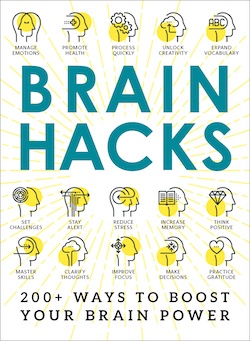6 Ways to Hack Your Habits for Optimum Brain Health
With tons of intel about how to optimize everything from your sleep habits to your coffee order right at your fingertips, it can be easy to forget that a single organ is responsible for keeping your whole body functioning: your brain.
While your brain is a complicated organ, taking care of it doesn't have to be. The editors of Brain Hacks have made it easier than ever to keep your mind nimble by compiling over 200 research-backed ways you can care for your brain, just by tweaking the things you already do.
Whether you have a few precious minutes to spare at your desk or an evening to commit to some (literal) mindful self-care, trying any of these hacks is a step towards better brain health.
Keep reading for 6 brain-boosting tips, excerpted from Brain Hacks by Adams Media.

1. Journal it
Keeping a daily journal—by hand, not on your laptop—benefits your brain. Recent studies show that writing by hand enhances your memory, helps both sides of your brain coordinate (integrating information from both sides of your brain helps you improve your perception), and inspires thought and creativity because the slower process allows for reflection. You also use more of your brain, specifically the motor cortex, when you write instead of type. A stimulated brain is a healthy brain! Writing by hand also helps relieve stress because repetitive actions can have a calming effect. This is particularly true if you write something calming, like five things you feel grateful for, rather than all the ways you hate your boss.

2. Stop multitasking
Trying to do a lot of things at once is supposed to be a sign that you’re smart and productive. But new research shows that multitasking—doing more than one task at a time—has very big drawbacks. First, your brain can’t actually multitask. What it does is switch from one task to the other, back and forth, back and forth. The problem? Your brain doesn’t perform as well when it is constantly distracted this way. It’s likely that the quality and efficiency of your work will suffer.

{{post.sponsorText}}
For the vast majority of people, it’s actually quicker for them to do tasks sequentially—plus they’re less likely to make mistakes. A small percentage of people are actually good multitaskers—their brains are capable of handling more than one task at a time—but you’d be wise not to count yourself among them. In fact, one study showed that people who thought they were good at multitasking were actually the worst at it.
Another study showed that people trying to deal with several tasks at once had significantly more problems paying attention and remembering information than those who did one task at a time. Habitual multitaskers actually train their brains to be less efficient. They have trouble organizing thoughts and focusing on what is important. As a consequence, they end up being slower, cumulatively, than those who do one thing at a time. Give your brain a break by giving up your multitasking ways!

3. Focus on better, not best
A study shows that eating exactly seven walnuts a day boosts your brain power. Researchers show that spending at least 68 minutes a day doing aerobic exercise is best for your brain. The list goes on. The number of best practices for your brain is long—and a little daunting. Learning how to pick the “better” option instead of struggling to attain the “best” one can help.
Trying to achieve perfection is the enemy of making progress. Sure, maybe 90 minutes of aerobics a day is ideal, but a brisk 30-minute walk every afternoon is much better than remaining glued to the sofa. Think of it this way: There’s a poor choice, a better choice, and a best choice. You want to avoid the poor choices, pick as many best choices as you can, and for the rest, go with “better.” It’s better for your brain health if you make some good choices rather than none—or give up because it seems too hard. For example, you know that the saturated fats in cheese make it food to avoid. But if you love cheese and can’t imagine living without it, pick an aged cheddar. That’s much better for you than a processed slice of goop. When making choices, ask yourself “What’s better?”

4. Celebrate your streaks
Your brain, like your boss, prefers success to failure. When it has a success, it releases dopamine, a feel-good neurotransmitter. This actually helps you remember what you did right so you can repeat it. In contrast, when you fail, you don’t get the nice dopamine reward—and so your brain can’t quite figure out what you did wrong. Despite what all those motivation gurus say, failure doesn’t actually teach you much. Success is how you learn. Researchers at MIT found that monkeys (which have brains a lot like ours) repeat the same mistakes over and over. Failure didn’t change the monkey’s behavior or help it do well on the next test. Success did.
Having a “streak”—where you successfully complete a certain habit or task repeatedly over a period of time—also causes your brain to release dopamine. The more successful you are over time, the more your brain wants you to be successful. So keep track of your brain-healthy habits. For example, every time you get some aerobic exercise, mark it on a calendar. When you review the calendar, you’ll see a series of successes and your brain will be motivated to continue succeeding. In other words, you can use your brain to help your brain stay healthy.

5. Stay hydrated
Simple dehydration—not drinking enough water—can cause the brain to react in strange ways. Symptoms of dehydration include fogginess, dizziness, and lack of concentration. Water is one of the most abundant substances in your body, and it is the nutrient your body needs in the greatest amounts—between 55 and 75 percent of your body weight is water. Water plays a vital role in almost every major function in the body. It transports nutrients and oxygen to the brain and carries waste products away from the body cells. The brain is 73 percent water, so if it’s going to keep on functioning properly, that water has to be replenished. The body has no provision to store water. On average, we lose about 10 cups of water each day just through perspiration, breathing, urination, and bowel movements. This does not include hot days or exercise sessions, when perspiration drains away even more water. The average adult needs to drink 8 to 12 cups of water each day. By the time you feel thirsty, you can already be on your way to becoming dehydrated. To be sure you are properly hydrated, check your urine to make sure it is clear or pale yellow (meaning diluted) rather than a darker yellow.

6. Take a day off
Numerous surveys of American workers show they rarely take time off for vacations, and when they do, they’re constantly checking email and texts from work anyway. This is a great way to burn out your brain. One study showed that people who took off one day per week—one day without any work-related tasks—ended up being more productive overall than those who didn’t. Not surprisingly, they also reported feeling less stressed. One researcher analyzing data from several studies found that idleness—not having to do anything work-related—helped the brain process information, make new connections, and even understand ourselves and other people better (one benefit of idleness is introspection). We also solve problems and remember things better if we take real breaks from work.
Want even more help upstairs? These are the supplements to know about for boosting brain function. And this is what happened when one of our editors tried nootropics to increase her productivity at work.
Loading More Posts...
